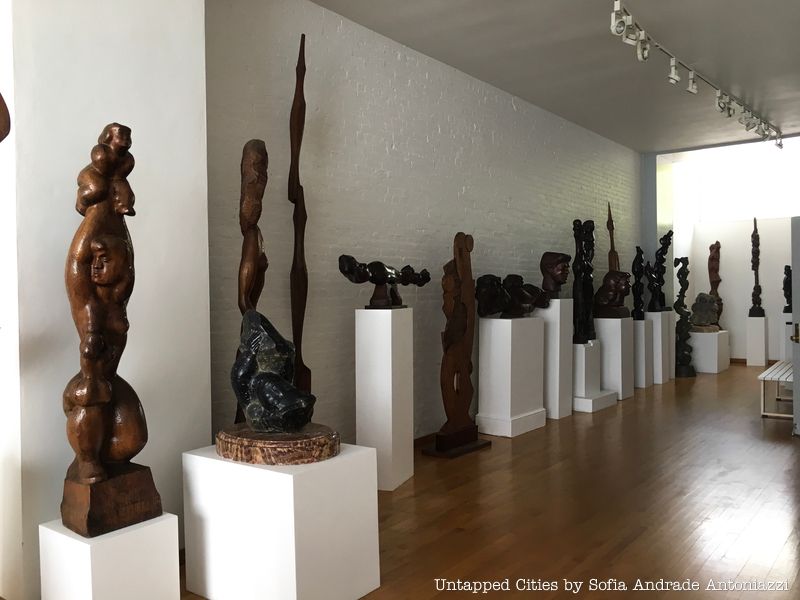100th Anniversary Great Nave Tour at the Cathedral of St. John the Divine
Celebrate the 1925 construction of the stunning nave inside the world's largest Gothic cathedral!


Walking past the Renee and Chaim Gross Foundation at 526 LaGuardia Place, you just might miss it. There are no clear demarcations that an amazing museum lurks past the unique planters, save a 2012 sign by Brooklyn-based artist Mike Levy. This conscientious discretion suits the longtime role of familial privacy the house continues to preserve.
The townhouse was built in the 1830s, in an area now best known for New York University. In the 1880s, the property was converted into an industrial loft, but the Gross family turned the space back into a home in 1963. In addition to its original role as a residence, the Gross family added a custom-designed sculpture studio to the ground floor entrance, which is still intact today.
The four-floored townhouse was first and foremost a family home, thus everything from the original living rooms to the family bedrooms are maintained. The property successfully straddles the line between the aestheticism of museum and the intimacy of home. Upon entry, the viewer is dazzled with sculpture spanning 60 years of Chaim Gross’s career (1920s-1980s) in the main gallery. An additional exhibition space on the second floor is used for traveling, non-specific showcases year-round. However, groups are not advised to visit during the un-airconditioned summer season. The house was not airconditioned because the Gross family summered in Provincetown.
The true triumph of Chaim Gross’s legacy is his personal art collection, housed in the third floor living room. The layers of floor-to-ceiling oil paintings, lithographs and silkscreens are impressively juxtaposed against family portraits by Chaim Gross himself and work by Willem de Kooning, Max Ernst, George Grosz, Fernand Leger, Marc Chagall and others.

Gross’s showcase is displayed with a unique curatorial eye of an artist rather than the academic. Surrounded by couches and warm-colored carpets, the near-haphazard energy of placement around the room channels the decisions of an impulsive creator rather than a calculating historicist. De Kooning is offset by tribal masks, and Gross’s own Judaica, like Ketubah (wedding contracts) and printed Hebrew scrolls. Unlike the arguably typical curatorial perspective of a museum or gallery, designed in a linear and potentially provocative systemization to illuminate an exhibition to a new viewer, this decorative living room is stylized to imply an impulsive, insatiable curiosity, indicative of his own artistic style as much as those of the artists he chose.
Personalization and familiarity present in so many of the continued decisions by the foundation, not least in the appointment of the foundation’s Executive Director, Dr. Susan Greenberg Fisher. While she went on to complete a Ph.D. in art history from Yale and work for the Yale Art Center, Fisher completed her undergraduate degree at Oberlin College in Ohio. It was at Oberlin that she met Saskia Grooms, Chaim and Renee’s granddaughter. Saskia’s parents, Mimi Gross (Chaim and Renee’s daughter) and Red Grooms, are also painters.
Chaim Gross is also a study in the balance of personal warmth and professional success, as is evidenced by the myriad of photos adorning the entrance to the living room. As founding president of the Sculptor’s Guild in 1937, Gross met and was photographed with activist Helen Keller by spring 1938. 40 years later, he is pictured with photographer Richard Avedon at a Metropolitan Museum of Art exhibition. Another photo features Marilyn Monroe.
The Renee and Chaim Gross Townhouse is a study in the fusion of art creation, collection, and lifestyle, and a worthwhile visit for anyone interested in 2oth century art and overall biography. The property is managed by the Renee and Chaim Gross Foundation, with more information available on their website.
Renee and Chaim Gross Townhouse
526 LaGuardia Place [Map]
New York, NY 10012
Subscribe to our newsletter